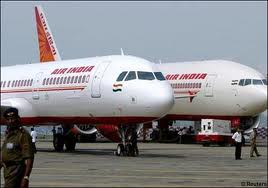
New Delhi, May 11: Crisis-ridden Air India has stopped booking for all flights to North America and Europe till next Tuesday (May 15) as the striking pilots of the erstwhile AI did not resume work despite a clear Delhi high court order. While the airline had asked the 293 pilots who had reported sick till Wednesday night to report to work by 10 am on Thursday, 12 more members of the Indian Pilots Guild (IPG) joined the sick bay during the day taking the figure up to 305.
AI has now cancelled the Amritsar-Delhi-Toronto flight till the strike gets over. About 20 flights were cancelled on Thursday from Delhi and Mumbai to New York, Chicago, Frankfurt, Riyadh, Shanghai and Seoul, leaving hundreds of passengers stranded for the third straight day.
While IPG, that's headed by Nationalist Congress Party MLA Jitendra Ahwad, made it clear they would not join work till their demands are met, the management further hardened its stand on Thursday - third day of the ongoing strike. It sacked 10 more pilots, after terminating services of 36 others earlier. But the strictest action it is planning to take is recommend cancellation of flying licence of 10 IPG office bearers under section 39 of the Indian Aircraft Act "in public interest".
"We have filed criminal contempt in Supreme Court against the striking pilots on the grounds that they are trying to prevent us from implementing an apex court order which said pilots of erstwhile Indian Airlines should also be trained for the Boeing 787 Dreamliner. We will file civil contempt in the high court as pilots have not joined work despite a clear HC order," said an official.
Aviation minister Ajit Singh, who will be briefing PM Manmohan Singh on the AI crisis on Friday, maintained that pilots must first resume work. "We may face short term problems for some time (referring to a possible shutdown of international flights if pilots keep away from work). But we will do whatever is needed to have an international presence for AI in the long term. If pilots are not listening to court, will they listen to anyone else?" Singh said indicating the government's firm backing to the stern steps that he has authorized the airline to take.
There is increasing disquiet in the airline over an NCP MLA, who is not even an AI pilot, spearheading the attack from IPG side and leading to a crisis where the Rs 30,000-crore bailout package could come under a cloud.






Comments
Add new comment